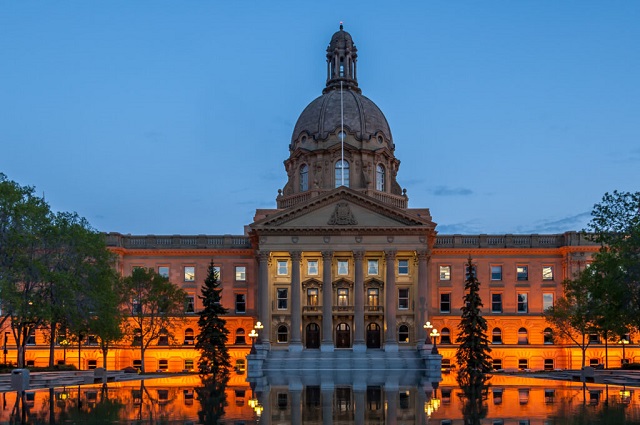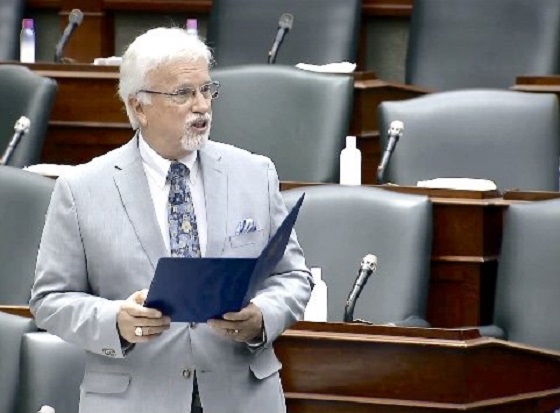Alberta
RDC and Alberta Colleges supporting soldiers

From RDC Communications
RDC joins Colleges Alberta partnership supporting reservists
A group of 12 Alberta post-secondary institutions have signed a memorandum of understanding supporting Canadian Armed Forces (CAF) Reservists who are college employees or students.

The services of Canadian Reservists may be required by the Department of National Defence while having work or study commitments at RDC, or partnered colleges. Leave may be granted under this memorandum, securing their employment and accommodating their studies until they return.
“It is really important if Reservists get called to duty, or have opportunities to train, our institutions support them,” says Joel Ward, RDC President & CEO, on behalf of Colleges Alberta. “There were some formal policies in place but we decided as a group of Alberta colleges to make a strong statement through a MOU, supporting Reservists in our institutions, whether they are students or employees.”
Of the approximately 90,000 dedicated men and women serving in the Canadian Armed Forces, 26,000 are Reservists. About 30 per cent of those Reservists are students. As needed, several accommodations will be available for these learners. Tests and assignments can be rescheduled, and a program may be deferred during a lengthy deployment.
As Commander of 41 Canadian Brigade Group (41 CBG), Colonel Eppo van Weelderen, recognizes the importance and value of this formal agreement. “This collaboration among the Alberta colleges is paramount to continue the development of educated, hard-working and strong leaders for Canada,” he says. “This will help provide the necessary supports to our soldiers as they fulfill their duties serving our nation, in our communities and abroad.”
Forty-one CBG is one of three Army Reserve formations within 3rd Canadian Division. Made up of nine units and a brigade headquarters in Calgary, 41 CBG has seen the number of reserve soldiers increase by nearly 10 per cent the past two years, to approximately 1,600 reserve soldiers garrisoned in Calgary, Edmonton, Lethbridge, Medicine Hat, Red Deer and Yellowknife. Ninety per cent of the soldiers serve part-time.
Carolyn Patton, Alberta Chair of Canadian Forces Liaison Council, views the agreement as mutually advantageous. “This memorandum strengthens the relationship and provides benefits to both parties,” she says. “While serving our country, the Reservists will be able to focus on their duties, and share their skills, knowledge and experiences when they return to their college settings, and communities.”
Maria Anderson, RDC Technician Parts Instructor, has taught at Red Deer College since 2013. She has previously been granted leave by RDC to fulfill her duties as a Reservist. The support from RDC, along with this formal agreement accommodating all Reservists in this group of Alberta colleges, will allow for future development.
“I am grateful to have an employer who encourages my career in the Canadian Army Reserves,” says Anderson. “Knowing that I am supported if I have an opportunity for military training allows me to grow professionally and personally, in ways that benefit my whole community.”
The Reservists’ diverse skillsets provide tremendous value to colleges, and beyond. “The leadership and skills that are developed through military training produces strong employees and students at Red Deer College, and their work benefits the citizens of Canada in many ways,” says Ward. “Reservists are used, not just overseas in combat missions, but also in civil emergencies. Whether it was the ice storm that was in Quebec, or floods, the Reservists are the first to be called so we need to support them.”
To join the Canadian Reserve, contact the nearest armoury in your community. For more information and a list of units in your region, visit the Canadian Army Reserve online.
About Canadian Forces Liaison Council: Canadian Forces Liaison Council is a group of more than two hundred Canada-wide senior business executives and educational leaders, a full-time Secretariat and a national network of Reserve officers. The civilians volunteer their time and efforts to promote the primary Reserve Force by highlighting the benefits of Reserve Force training and experience to the civilian workplace. They also support individual Reservists as well as Reserve units in matters related to employer support. The Council’s mandate is to enhance the availability of Reservists for their military duties by obtaining the support and co-operation of organization leaders in Canada. The Council encourages civilian employers and educational institutions to grant Reservists time off on a voluntary basis, without penalty, to allow them to participate in their military activities, duties and training.
About RDC: For 55 years, RDC has been proudly serving its learners and communities. The College continues to grow programs, facilities and opportunities as it transitions to become a comprehensive regional teaching university during the next three to five years.
This year, RDC will add seven new programs to more than 100 established programs (including full degrees, certificates, diplomas and skilled trades programs). RDC educates 7,500 full-and part-time credit students and more than 38,000 youth and adult learners in the School of Continuing Education each year. The College is expanding its teaching, learning, athletic and living spaces with the additions of the state-of-the-art Gary W. Harris Canada Games Centre/Centre des Jeux du Canada Gary W. Harris, Alternative Energy Lab and construction of a new Residence which all enhance RDC’s Alternative Energy Initiative. Main campus is strategically situated on 290 acres of Alberta’s natural landscape along Queen Elizabeth II Highway. RDC is also proud to serve its Donald School of Business students housed at a downtown campus, located in the Millennium Centre, in addition to housing teaching and learning space at the Welikoklad Event Centre.
For more information on RDC, please visit: rdc.ab.ca
Alberta
Official statement from Premier Danielle Smith and Energy Minister Brian Jean on the start-up of the Trans Mountain Pipeline

Alberta
Protecting the right to vote for Canadian citizens: Minister McIver

Minister of Municipal Affairs Ric McIver issued the following statement in response to Calgary City Council’s vote to extend the right to vote to permanent residents:
“Yesterday, Calgary city council passed a motion advocating for permanent residents to be extended the right to vote in civic elections. Alberta’s government has been clear since the beginning: only Canadian citizens are able to vote in civic elections. That will not be changing.
“The Canadian Charter of Rights and Freedoms affirms the right of every Canadian citizen to vote and to run as a candidate. This right extends to voters in municipal, provincial and federal elections.
“Protecting our democracy is of the utmost importance. Our provincial election legislation, like the Local Authorities Elections Act, has also been clear since its inception that voting is a right of Canadian citizens.
“Alberta’s government is also ensuring that voting is accessible for more Albertans. The Municipal Affairs Statutes Amendment Act proposes to enable special ballot access for any voter who requests it, without having to provide any specific reason such as physical disability, absence from the municipality or working for the municipal election. The ministries of Seniors, Community and Social Services and Service Alberta and Red Tape Reduction are also making it easier for individuals to obtain the identification Albertans need for a variety of services, including the ability to cast a ballot.
“Our government will continue to protect the integrity of our elections and make sure voting is accessible for all Albertans who are Canadian citizens.”
-

 Education8 hours ago
Education8 hours agoSupport a young reader through the Tim Hortons Smile Cookie campaign
-

 Alberta1 day ago
Alberta1 day agoAlberta’s vision for passenger rail
-

 Automotive2 days ago
Automotive2 days agoCanadian interest in electric vehicles falls for second year in a row: survey
-

 RCMP1 day ago
RCMP1 day agoRed Deer RCMP arrest two individuals following ramming of police vehicle
-

 Education1 day ago
Education1 day agoRebels earn Jim Donlevy Memorial Trophy as WHL Scholastic Team of the Year
-

 COVID-192 days ago
COVID-192 days agoFormer Canadian lawmaker has no regrets about refusing COVID shot despite losing his job
-

 John Stossel1 day ago
John Stossel1 day agoWhy Biden’s Just Wrong: NO ONE “Knows How to Make Government Work.”
-

 Alberta1 day ago
Alberta1 day agoThree Calgary massage parlours linked to human trafficking investigation





